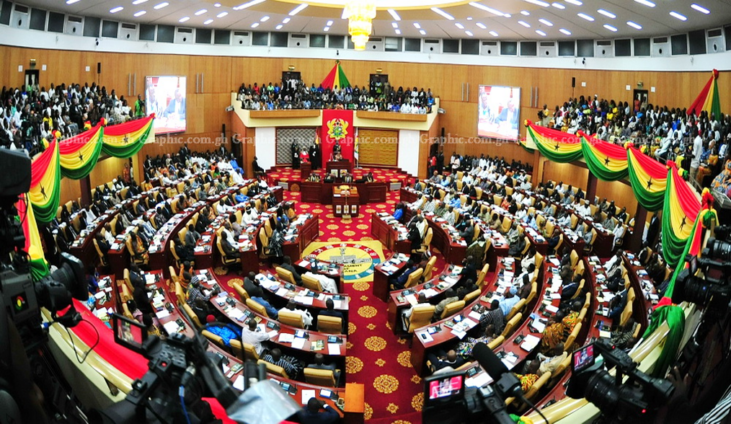It goes without saying that the relationship between the three arms of government is based on a tripod arrangement, resting on an immutable platform provided by the Constitution to preserve and conserve the eternal principles of separation of powers.
The equality of powers among these three pillars of government is not intended to forestall or eliminate the possibility of a leader. Indeed, there is a leader! In other words, all of them are leaders, albeit independently in their respective domains.
The 1992 Constitution of Ghana, under Article 93(2), vests legislative authority solely in Parliament. It provides that "the legislative power of Ghana shall be vested in Parliament and shall be exercised in accordance with the provisions of this Constitution."
Parliament, therefore, has full authority to regulate its internal proceedings and procedures, as stipulated in Article 110, which grants Parliament the authority to adopt its Standing Orders to govern its internal functions, including determining matters related to the qualification and disqualification of its members, as outlined in Article 97.
The Constitution explicitly emphasizes the autonomy of each arm of government, ensuring that neither the Judiciary nor the Executive can interfere with the proper functioning of Parliament. Article 97(1) (g) and (h) of the Constitution grant the Speaker of Parliament the authority to declare a seat vacant in the following terms: “(g) if he leaves the party of which he was a member at the time of his election to Parliament to join another party or seeks to remain in Parliament as an independent member; or (h) if he was elected a member of Parliament as an independent candidate and joins a political party.”
It would provoke legal anxiety if any of these three organs acted in a manner that undermines the independence of the others; such actions would also amount to a constitutional taboo, potentially prompting years of jurisprudential penance to cure. A flexible observation and balanced perspective prevent me from turning a blind eye to the concept of checks and balances, which ensures that none of these organs enjoys its independence to the detriment of the collective goal of governance. However, checks and balances will have no bearing when any of the bodies acts within the parameters established by the Constitution.
The Supreme Court, while entrusted with the judicial power of interpreting the law under Article 125, must ensure its decisions align with the Constitution. The Supreme Court’s decision to issue an order that encroaches upon Parliament’s legislative authority contradicts Article 122, which emphasizes that acts or omissions amounting to interference with parliamentary proceedings can be treated as contempt of Parliament.
The Speaker is well within his rights to resist such action by invoking Parliament’s powers under Article 122, which states: "An act or omission which obstructs or impedes Parliament in the performance of its functions, or which obstructs or impedes a member or officer of Parliament in the discharge of his duties or affronts the dignity of Parliament, or which tends either directly or indirectly to produce that result, is contempt of Parliament."
The aforementioned principles are meant to serve as guiding considerations when evaluating the extant order of stay of execution granted by the Ghanaian Supreme Court regarding an act carried out by Parliament in exercising its constitutional mandate. There is no legal or academic instrument upon which this secured order can be clothed with legitimacy.
With the utmost respect, the judiciary, in granting this order, has arrogated to itself a power that is not, has never been, and can never be vested in it by the Constitution. Any judicial attempt to sustain this order will not only make our Parliament an irritating rubber stamp but also serve as an administrative cancer to the lifeblood of democracy. It is my supplication that such a day is neither heard of nor seen.

I acknowledge that the role of interpretation is the birthright of the judiciary, but this duty becomes impotent in the face of an express interpretative procedure laid down by the Constitution regarding the operation of any of the organs. No organ of government, no matter how highly placed, can claim to be wiser or more professional in its interpretative exercise than the Constitution. It is a cardinal principle of law that what is expressly stated in any legal document should be given its ordinary meaning.
In conclusion, it is my submission that the court, in its everlasting wisdom, should revisit this existing, albeit concerning, order to prevent any legal pronouncement that will mock the sanctity of the independence of Parliament or any organ of government.
Kadri Abdul Rauf Issifu Esq.
Barrister and Solicitor of the Supreme Court of Ghana & Nigeria
Kadri.rauf@gmail.com 0240189094
Latest Stories
-
Togo issues international arrest warrants for leaders behind civil protests
16 minutes -
GUSA Champions Ghana’s Pride at 2025 FISU World Games in Germany
58 minutes -
Africa Film Finance Forum unlocks path to $20bn film economy
1 hour -
Bright Simons: Ghana and Nigeria are early victims of new US visa restrictions policy
1 hour -
Trade Minister inaugurates new GIPC board, tasks it to bolster investment drive
1 hour -
Today’s Front pages: Thursday, July 10, 2025
1 hour -
As the world reconfigures, can Africa claim its economic power?
2 hours -
Government appoints Ken Thompson as Chairman of ADB
2 hours -
DopeNation out with 3rd studio album GhanaPiano (The Album)
2 hours -
Abstention is complicity – Minority caucus blasts gov’t over LGBTQ vote
3 hours -
Gov’t betrays its own promises on LGBTQ – Samuel Jinapor fires over UN abstention
3 hours -
‘You need to shape up’: Trump’s pick for Singapore envoy grilled in Senate
3 hours -
Former Love Island USA contestant apologises for using slur in post
4 hours -
Trump is right on migration – John Kerry says Biden allowed ‘siege’ on border
4 hours -
Trump sells shift from ‘aid to trade’ in White House meeting with African leaders
4 hours

